Search for a course
Applications are now open for courses that are delivered fully online.
Find out more about studying here
Pioneering research to prevent and treat mental health issues in our young people
One in five children and young people in the UK has a probable mental health issue, according to the Mental Health of Children and Young People 2023 survey, co-led by the University of Exeter. We face a global crisis and our research is finding new ways to combat this.
Find out more
Delivering Green Solutions
Find out about Exeter’s leading work on positive tipping points and new Global Tipping Points Report in partnership with the Bezos Earth Fund.
Top 160 in the world1
Top 15 in The Times and Sunday Times Good University Guide 2024 and the Complete University Guide 2024
Exeter graduates in the UK’s top 10 for most targeted by leading employers2
1153rd in the QS World University Rankings 2024, 2 The Graduate Market in 2024 report by High Fliers Research,
3Times Higher Education (THE) Impact Rankings 2023
Exeter’s ‘solid gold’ standard for teaching excellence amongst best in the UK

The University is amongst an elite group of Higher Education institutions to be recognised as consistently providing outstanding teaching, learning and student outcomes to secure the ‘Gold Overall’ standard in the TEF assessment.







